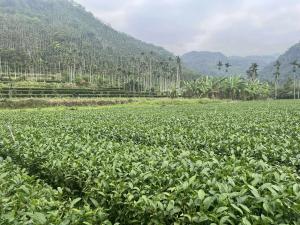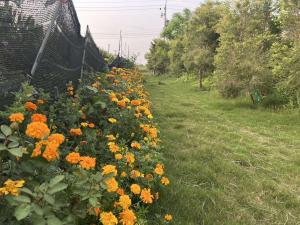Satoyama Mace Initiative Gains UNU-IAS/IPSI Endorsement: Taiwan’s Global Biodiversity Carbon Program
UNU-IAS/IPSI endorses Taiwan’s Satoyama Mace Initiative, linking nature-based solutions, biodiversity carbon credits, and global voluntary markets.
TAIWAN, August 25, 2025 /EINPresswire.com/ -- The Satoyama Mace Initiative, officially endorsed by the United Nations University Institute for the Advanced Study of Sustainability (UNU-IAS) through its International Partnership for the Satoyama Initiative (IPSI), is now being executed by the SEPLS Carbon Credit Regional Revitalization Center. This milestone marks the world’s first non-profit organization (NPO) gaining international recognition to certify biodiversity-based carbon credits while promoting rural revitalization.
The initiative focuses on linking nature-based solutions (NbS), biodiversity conservation, and carbon sequestration with rural regeneration and international carbon markets. It aims to build a sustainable model that enables local communities to actively participate in global carbon neutrality actions.
Global Alignment with Voluntary Carbon Market Developments
The Satoyama Mace Initiative is designed to align with the emerging voluntary carbon credit frameworks of major global economies:
1. demand for voluntary carbon credits to meet corporate net-zero goals.
2. connection to the Carbon Border Adjustment Mechanism (CBAM) effective 2026 and biodiversity-focused climate investments.
3. expansion of the J-Credit Scheme and international cooperation on Article 6 trading.
4. advancing voluntary carbon markets and positioning as a regional hub for carbon neutrality in semiconductor, electronics, AI, and manufacturing industries.
This global compatibility ensures that biodiversity carbon credits generated under Satoyama Mace methodologies will be relevant and accessible across multiple international markets.
Developing Innovative Methodologies
In collaboration with Mr. Ander Mader, Principal Networking Coordinator / Principal Policy Researcher, Biodiversity and Ecosystem Services, The Institute for Global Environmental Strategies (IGES), the initiative is developing pioneering Biodiversity-SDGs methodologies, endorsed as key frameworks by UNU-IAS/IPSI. These methodologies are being aligned with the Kunming–Montreal Global Biodiversity Framework (KMGBF) and the UNFCCC CDM/Article 6 mechanisms, including:
1. Nature-based solutions (NbS)
2. Adaptive Satoyama/Satoumi farmland utilization in Asian landscapes
3. Hydrogen energy and carbon capture (CCUS)
4. Biochar and soil carbon enhancement
5. Beneficial microbe-based agricultural waste valorization
The methodology review process is being carried out with the valuable support of UNU-IAS/IPSI, UNDP, UNEP, UNFCCC, and VVBs (validation or verification bodies) ensuring scientific rigor, transparency, and international credibility.
Voices from the Initiative
“Carbon credit certification has long been dominated by a handful of international corporations, leaving rural farmers excluded from the benefits,” said Prof. Shu-Mei Wang of National Taiwan University. “For the first time, with UNU-IAS/IPSI endorsement, farmers are empowered to directly access international carbon markets, supported by both economic and technological assistance.”
According to Dr. Chen-Piao Yen, Chair of Tainan New Agriculture Biotech Cooperative, “Carbon credits are not only an environmental mechanism but also an economic catalyst. By integrating biotechnology, improved farming practices, and renewable energy, agriculture becomes a critical player in achieving carbon neutrality while revitalizing rural economies.”
From Taiwan to the World
The Satoyama Mace Initiative has established the Satoyama Carbon Credit Regional Revitalization Base in Tainan, Taiwan, scheduled to begin official operations on January 1, 2025. This base will serve as an international hub for biodiversity carbon sequestration projects, supporting rural communities while contributing to global climate action.
Prof. Huey-Jen Su, Chair of the National Cheng Kung University Research & Development Foundation, has been appointed for Sustainable Action, promoting the cultivation of green ecosystems and advancing international cooperation on Article 6 trading. She advocates for the creation of a transnational carbon sequestration chain to mitigate climate change, helping enterprises achieve carbon neutrality while balancing industrial growth. Her work further fosters incentives for corporate emission reduction, encourages low-carbon production technologies, and supports innovative semiconductor and AI industry development.
About Satoyama Mace Initiative
The Satoyama Mace Initiative is a UNU-IAS/IPSI endorsed program led by the SEPLS Carbon Credit Regional Revitalization Center, focusing on nature-based carbon sequestration, biodiversity conservation, and rural revitalization. It pioneers globally applicable biodiversity-SDGs carbon credit methodologies, empowering farmers to benefit from international carbon markets while promoting climate resilience and sustainable development.
Media Contact
SEPLS Carbon Credit Regional Revitalization Center
https://ipsi.mse.ncku.edu.tw/platform
Vice Chairman/Chief Field Officer: Prof. Shu-Mei Wang
Email: wangsm@ntu.edu.tw
Phone: +886-2-33664420
Website: https://ipsi.mse.ncku.edu.tw/mainplatform-en
Shu-Mei Wang
SEPLS Carbon Credit Regional Revitalization Center
+886 2 3366 4420
wangsm@ntu.edu.tw
Visit us on social media:
LinkedIn
Other
Legal Disclaimer:
EIN Presswire provides this news content "as is" without warranty of any kind. We do not accept any responsibility or liability for the accuracy, content, images, videos, licenses, completeness, legality, or reliability of the information contained in this article. If you have any complaints or copyright issues related to this article, kindly contact the author above.





